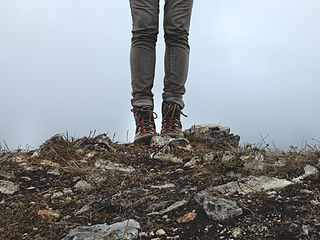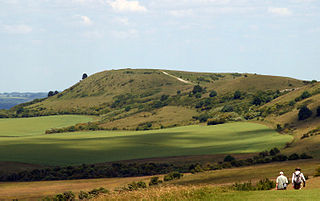
Ice skating is the self-propulsion and gliding of a person across an ice surface, using metal-bladed ice skates. People skate for various reasons, including recreation (fun), exercise, competitive sports, and commuting. Ice skating may be performed on naturally frozen bodies of water, such as ponds, lakes, canals, and rivers, and on human-made ice surfaces both indoors and outdoors.

Speed skating is a competitive form of ice skating in which the competitors race each other in travelling a certain distance on skates. Types of speed skating are long-track speed skating, short-track speed skating, and marathon speed skating. In the Olympic Games, long-track speed skating is usually referred to as just "speed skating", while short-track speed skating is known as "short track". The International Skating Union (ISU), the governing body of competitive ice sports, refers to long track as "speed skating" and short track as "short track skating".

The Elfstedentocht is a long-distance tour skating event on natural ice, almost 200 kilometres (120 mi) long, which is held both as a speed skating competition and a leisure tour. The Elfstedentocht is the biggest ice-skating tour in the world.

Ice skates are metal blades attached underfoot and used to propel the bearer across a sheet of ice while ice skating.

A sled, skid, sledge, or sleigh is a land vehicle that slides across a surface, usually of ice or snow. It is built with either a smooth underside or a separate body supported by two or more smooth, relatively narrow, longitudinal runners similar in principle to skis. This reduces the amount of friction, which helps to carry heavy loads.

Inline speed skating is the roller sport of racing on inline skates. The sport may also be called inline racing or speed skating by participants. Although it primarily evolved from racing on traditional roller skates, the sport is similar enough to ice speed skating that many competitors are known to switch between inline and ice speed skating according to the season.

Figure skates are a type of ice skate used by figure skaters. The skates consist of a boot and a blade that is attached with screws to the sole of the boot. Inexpensive sets for recreational skaters are available, but most figure skaters purchase boots and blades separately and have the blades mounted by a professional skate technician.

An ice rink is a frozen body of water and/or an artificial sheet of ice where people can ice skate or play winter sports. Ice rinks are also used for exhibitions, contests and ice shows. The growth and increasing popularity of ice skating during the 1800s marked a rise in the deliberate construction of ice rinks in numerous areas of the world.

Long-track speed skating, usually simply referred to as speed skating, is the Olympic discipline of speed skating where competitors are timed while crossing a set distance. It is also a sport for leisure. Sports such as ice skating marathon, short-track speedskating, inline speedskating, and quad speed skating are also called speed skating.

Tour skating is recreational long distance ice skating on natural ice. It is particularly popular in the Netherlands and the Nordic countries. It is becoming more popular in areas of North America such as New England, Southcentral Alaska, and Nova Scotia.

Tai Reina Babilonia is an American former pair skater. Together with Randy Gardner, she won the 1979 World Figure Skating Championships and five U.S. Figure Skating Championships (1976–1980). The pair qualified for the 1976 and 1980 Winter Olympics.

Hiking (walking) boots are footwear specifically designed for protecting the feet and ankles during outdoor walking activities such as hiking. They are one of the most important items of hiking gear since their quality and durability can determine a hiker's ability to walk long distances without injury. Hiking boots are constructed to provide comfort for walking considerable distances over rough terrain. Boots that protect the hiker's feet and heel are recommended. Hiking boots give ankle support and are fairly stiff. A less popular alternative is to use light trainers with thin soles. Footwear should be neither too loose nor too tight, to help prevent blisters and sore feet. Hiking socks that wick sweat from the feet, provide warmth, and cushion the feet are recommended and a thin, inner sock may also help. Most hiking boots are also designed for other outdoor activities such as backpacking, climbing, mountaineering, and hunting.

The kicksled or spark is a small sled consisting of a chair mounted on a pair of flexible metal runners that extend backward to about twice the chair's length. The sled is propelled by kicking the ground by foot. There is a handlebar attached to the top of the chair back. Kicksled is a direct translation of the Finnish word potkukelkka. Estonian calls it either a 'pushsled' or 'Finnish sled'. Some other possible translations are kicker and chair-sled.

"Walking on Thin Ice" is a song by Yoko Ono, released in 1981. She and John Lennon concluded the recording of the song on December 8, 1980. It was upon their return from the recording studio to The Dakota that Lennon was murdered by Mark David Chapman. Lennon was clutching a tape of a final mix of the song before it was mastered when he was shot. The song was both a critical and commercial success for Ono.

Peter Alan Mueller is an American speed skating coach and former speed skater.

Lackawanna State Park is a 1,445-acre (585 ha) Pennsylvania state park in Benton and North Abington Townships, Lackawanna County, Pennsylvania in the United States. Lake Lackawanna, a 198-acre (80 ha) man-made lake, is the central focus of recreation at the park. Lackawanna State Park is located near Dalton on Pennsylvania Route 524 just off exit 199 of Interstate 81.

Wanneperveen is a village in the Dutch province of Overijssel. It is located in the municipality of Steenwijkerland, about 4 km west of Meppel.

Bullough's Pond, a former mill pond located in Newton, Massachusetts, is now a decorative pond in a suburban neighborhood, used for bird watching and walking. In the nineteenth century it was the site of a commercial ice business. Since the early 2000s, temperatures have warmed to the point that its winter ice is no longer thick enough to support skating safely.

Walking is one of the most popular outdoor recreational activities in the United Kingdom, and within England and Wales there is a comprehensive network of rights of way that permits access to the countryside. Furthermore, access to much uncultivated and unenclosed land has opened up since the enactment of the Countryside and Rights of Way Act 2000. In Scotland the ancient tradition of universal access to land was formally codified under the Land Reform (Scotland) Act 2003. In Northern Ireland, however, there are few rights of way, or other access to land.

Human-powered land vehicles are land vehicles propelled over ground by human power, The main ways to support the weight of a human-powered land vehicle and its contents above the ground are rolling contact; sliding contact; intermittent contact; no contact at all as with anything carried; or some combination of the above. The main methods of using human power to propel a land vehicle are some kind of drivetrain; pushing laterally against the ground with a wheel, skate, or ski that simultaneously moves forward; by pushing against the ground directly with an appendage opposite to the direction of travel; or by propeller. Human-powered land vehicles can be propelled by persons riding in the vehicle or by persons walking or running and not supported by the vehicle.


















